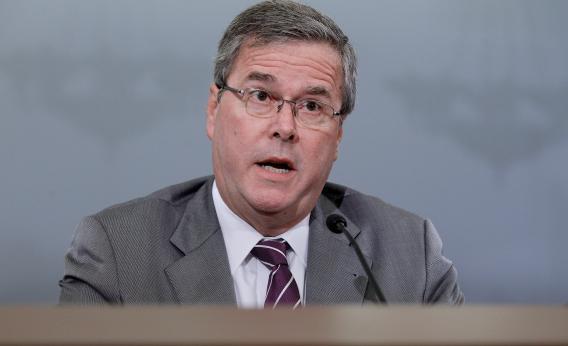Former Florida Governor Jeb Bush, a hero to the right begged by many to enter this year’s presidential race, says the modern-day Republican Party is a bit too orthodox even for his father and Ronald Reagan:
“Ronald Reagan would have, based on his record of finding accommodation, finding some degree of common ground, similar to my dad, they would have had a hard time if you define the Republican Party — and I don’t — as having an orthodoxy that doesn’t allow for disagreement,” Mr. Bush said at question-and-answer session with reporters and editors held Monday morning in Manhattan by Bloomberg View.
“Back to my dad’s time or Ronald Reagan’s time,” he said, “they got a lot of stuff done with a lot of bipartisan support that right now would be difficult to imagine happening.”
Mr. Bush’s comments help solidify his role as the Republican Party’s leading voice of moderation at a time when many in the party — particularly Tea Party adherents — are calling for ever-greater ideological discipline. And he continued a trend this campaign cycle of big-name presidential endorsers going off script from the campaigns they support. Mr. Bush has endorsed Mitt Romney’s candidacy.
Mr. Bush was careful to emphasize that he believed the modern-day Democratic Party was equally dug in on ideological and partisan grounds, saying, “this dysfunction, you can’t say it’s one side or another.” And he said President Obama had failed to live up to his promise to be a transcendent leader, specifically pointing to failure to embrace the advice of the bipartisan deficit panel he created, known as the Simpson-Bowles Commission.
Bush, like his brother, wants the party to try harder to win Hispanic voters, and defends the (tax-raising) budget deal his dad cut in 1990 that many conservatives blame for the 41st president’s defeat to Bill Clinton.
But that was a different era, when outside groups like the Club for Growth weren’t spending millions to keep pragmatic congressional Republicans from stepping out of line. The risks in the modern GOP – of drawing a primary challenge by a Tea Party insurgent, for example – in gaining a reputation as a negotiator or problem-solver are immense in a way they weren’t even ten years ago. Bush may just need to get used to the new way of things.
